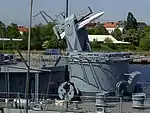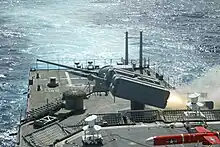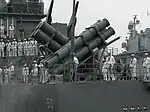List of United States Navy Guided Missile Launching Systems
The Guided Missile Launching System (GMLS) is a device for launching guided missiles, and is found on many U.S. Navy ships. This list includes all launchers that are part of the designation series. Included on this list are missile launchers that have not been adopted for service in the United States Navy.
Launchers by designation
| Picture | Designation | Description |
|---|---|---|
| Mk 1 | Twin Arm Terrier Launcher on USS Mississippi for initial Terrier testing. | |
| Mk 4 | Early Twin-arm launcher for the RIM-2 Terrier. Fit only to the Boston-class guided missile cruisers. Vertically loading design distinguished this launcher from the horizontally loading Mk 9 and Mk 10. | |
| Mk 5 | Twin-arm launcher for the Terrier, Tartar and Standard missiles. Terrier Extended Range missiles were fired from its right arm rail, while Tartar Medium Range missiles were launched from its left arm. Used at USS Desert Ship Navy surface-to-air weapons testing facility at White Sands Missile Range. | |
_1960_(KN-1120).jpg.webp) |
Mk 7 | Twin-arm launcher for the RIM-8 Talos missile. Used on Galveston-class cruisers. Differed from Mk 12 in that all missiles were stored above main deck. |
| Mk 8 | Twin-arm launcher for the RIM-2 Terrier missile. Used on USS Gyatt. | |
| Mk 9 | Twin-arm launcher for the RIM-2 Terrier missile. Used on Providence-class cruisers. Differed from Mk 10 in that all missiles were stored above main deck. | |
%252C_circa_in_July_1990_(6468165).jpg.webp) |
Mk 10 | Twin-arm launcher for the RIM-2 Terrier or RIM-67 Standard missile. Employed below main deck magazines. Used on Belknap-class cruisers and other Terrier ships. Some launchers are modified to store and launch the RUR-5 ASROC.[1] |
_launching_a_RGM-84A_Harpoon.jpg.webp) |
Mk 11 | Twin-arm launcher for RIM-24 Tartar or RIM-66 Standard missile. Used on Albany-class cruisers and the first thirteen Charles F. Adams-class destroyers. The New Threat Upgrade added the ability to launch RGM-84 Harpoon anti-ship missiles. |
%252C_in_1962_(NH_98462).jpg.webp) |
Mk 12 | Twin-arm launcher for the RIM-8 Talos missile. Employed below main deck magazines. Deployed on Albany-class cruisers and USS Long Beach. |
 |
Mk 13 | A Single-arm rail-launch system. Initial mods fired RIM-24 Tartar missiles, while later mods supported RIM-66 Standard and RGM-84 Harpoon missiles (40 missiles total). Used on Oliver Hazard Perry-class frigates and California-class cruisers and other Tartar ships.[1] |
| Mk 14 | A Mk 13 launcher for the RIM-55 Typhon MR. Canceled. | |
_Launching_Harpoon.jpg.webp) |
Mk 16 | The 8-round ASROC "Pepper Box" launcher for the RUR-5 ASROC. Used on many USN and other vessels. Some vessels such as the last three Brooke-class frigates, all Knox-class frigates, California-class cruisers and the Spruance-class destroyers had reloading systems and up to 16 reloads. Other classes of vessel had no reloads.[2] |
| Similar to Mk 13 launcher. | Mk 22 | A single-arm rail-launch system similar to the Mk 13, but with a smaller magazine (16 missiles total). It supports RIM-24 Tartar, RIM-66 Standard MR and RGM-84 Harpoon missiles, and is currently deployed on the US-designed Spanish Navy Baleares-class frigates.[3] Formerly used on Brooke-class frigates. |
%252C_circa_in_1982_(6483141).jpg.webp) |
Mk 25 | The box launcher for Basic Point Defense Missile system (BPDMS) carrying eight RIM-7 Sea Sparrow with mid-fins not folded. Used on Knox-class frigates and others. Replaced by Mk 29. |
| Mk 26 | A twin-arm rail-launch system which supports RIM-66 Standard, RUR-5 ASROC, and other missile types. It was used on U.S. Navy ships including early Ticonderoga-class cruisers, Virginia-class cruisers and Kidd-class destroyers.[3] | |
 |
Mk 29 | The 8-cell launcher, featured on Nimitz-class aircraft carriers and other NATO Sea Sparrow Missile (NSSM)-carrying ships. It fires RIM-7 Sea Sparrow missiles, with mid-fins folded making it smaller than the Mk 25 launchers.[3] Launchers are being retrofitted to launch the RIM-162D Evolved Sea Sparrow. |
| Mk 32 | Single round launcher for the standard missile. Used only by Taiwan, currently fit to the Chi Yang-class frigates.[3] | |
_aboard_the_guided_missile_cruiser_USS_San_Jacinto_(CG_56).jpg.webp) |
Mk 41 | The vertical launch system first fitted to USS Bunker Hill. These launchers are highly versatile and can launch a wide range of USN ordnance. Currently missiles that are operational from this launcher type are the RIM-66M Standard, RIM-156A Standard, RIM-161 Standard 3, RUM-139 VL ASROC, RIM-7 VL Sea Sparrow, RIM-162A/B Evolved Sea Sparrow, and the RIM-174A Standard ERAM.[4] |
| Mk 45 | Vertical launcher for the UGM-109 Tomahawk cruise missile on USN submarines.[5] | |
| Mk 48 | The Mk 48 GMLS is a vertical launch system for RIM-7 VL Sea Sparrow and the RIM-162C Evolved Sea Sparrow missile. This launcher is used primarily by the Royal Canadian Navy and Japanese Maritime Self Defense Force, but has not been adopted by the USN.[6] | |
 |
Mk 49 | The 21-round launcher for the RIM-116 Rolling Airframe Missile.[6] |
| Mk 53 | Nulka anti-missile decoy launcher.[6] | |
| Mk 56 | The Mk 56 GMLS is a vertical launch system for the RIM-162C Evolved Sea Sparrow missile. This launcher is primarily used by the Royal Danish Navy and has not been adopted by the USN | |
| Mk 57 | Peripheral Vertical Launching System, developed for the DDG-1000 destroyer.[7] | |
_launches_a_Naval_Strike_Missile_(NSM)_during_exercise_Pacific_Griffin._(48831412138).jpg.webp) |
Mk 87 | The RGM-184 NSM missile launch system.[8] |
 |
Mk 141 | The RGM-84 Harpoon missile tube launcher. |
 |
Mk 143 | The "Armored Box Launcher" for the BGM-109A/B/C Tomahawk cruise missiles. |
References
- Friedman, Norman, The Naval Institute Guide to World Naval Weapons Systems 1997-1998, Page 418, USNI Press 1997.
- Friedman, Norman, The Naval Institute Guide to World Naval Weapons Systems 1997-1998, Page 418-419, USNI Press 1997.
- Friedman, Norman, The Naval Institute Guide to World Naval Weapons Systems 1997-1998, Page 419, USNI Press 1997.
- Friedman, Norman, The Naval Institute Guide to World Naval Weapons Systems 1997-1998, Page 420-421, USNI Press 1997.
- Friedman, Norman, The Naval Institute Guide to World Naval Weapons Systems 1997-1998, Page 421, USNI Press (c) 1997.
- Friedman, Norman, The Naval Institute Guide to World Naval Weapons Systems 1997-1998, Page 421, USNI Press 1997.
- "Peripheral Vertical Launching System [PVLS]". www.globalsecurity.org. Retrieved June 12, 2008.
- Vavasseur, Xavier (2019-09-29). "USS Gabrielle Giffords is the 1st LCS to Get its Full Load of Next Gen NSM Missiles". Naval News. Retrieved 2022-04-06.
This article is issued from Wikipedia. The text is licensed under Creative Commons - Attribution - Sharealike. Additional terms may apply for the media files.